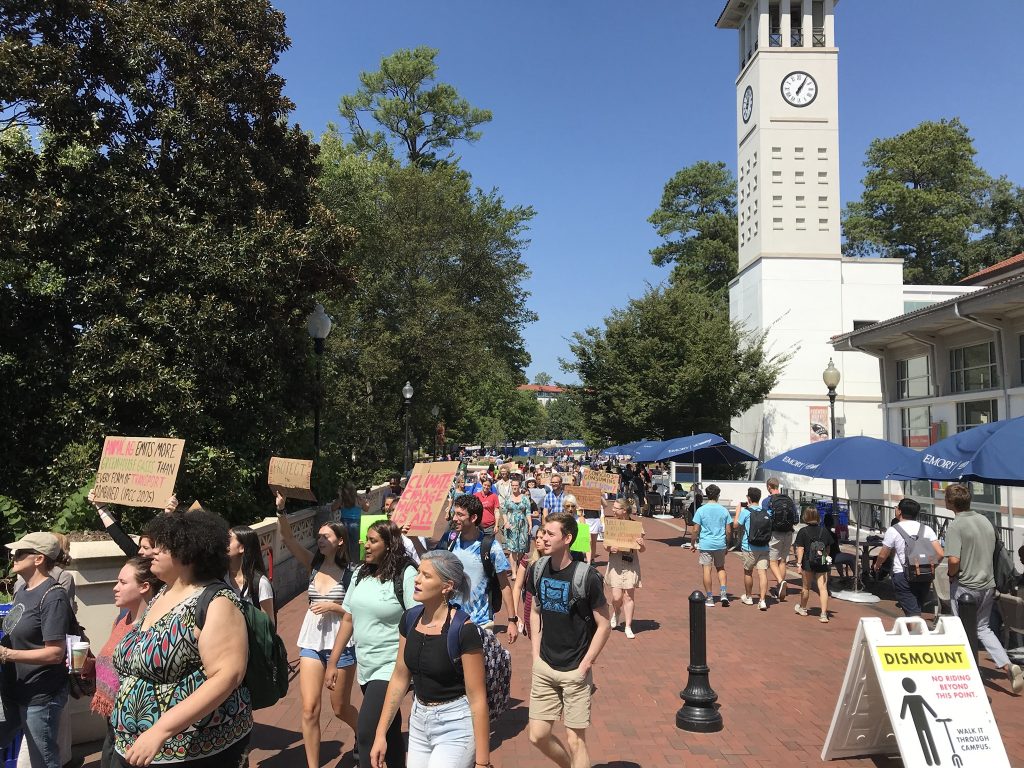
Photo Courtesy of Jaylan Jacobs (Emory Climate Analysis and Solutions Team)
We are living in an age of climate crisis. Emory University, despite its good intentions, has neglected its responsibility to address this emergency with the urgency it requires.
The Emory Climate Coalition demands that University President Gregory Fenves and the Board of Trustees substantially address Emory’s role as a significant contributor to the climate crisis. Together, the Emory community will be rallying on Friday to call for meaningful changes to the University’s climate policies.
This summer, we watched in horror as natural disasters exacerbated by the rapidly changing climate took hundreds of lives in the U.S. and affected the livelihoods of hundreds of millions of people around the world. A barrage of wildfires, floods, droughts, hurricanes, extreme heat events and more will threaten every corner of the globe, and the southeastern U.S. will not be spared. Climate change will also disproportionately affect the Global South despite its vastly lower emissions footprint, with one recent example being the first climate-change caused famine in Madagascar. Humanity is facing an existential threat as the effects of climate change continue to escalate. Rapid action is imperative to stave off the worst effects of this climate emergency.
The Sixth Assessment Report (AR6) by the Intergovernmental Panel on Climate Change, published last month, addresses the need for immediate and drastic action worldwide. Because the U.S. is much to blame for historical greenhouse gas emissions and possesses much of the resulting wealth, our institutions must not only achieve but go far beyond these emissions targets to give the world a viable chance of meeting these ambitious targets on a global level.
Emory’s current climate commitments are woefully insufficient. The most recent University-wide climate action plan was published over a decade ago. Although Emory has since updated its emissions goals to a 45% emissions reduction by 2030 (from 2010 levels) and net-zero emissions by 2050, no new climate action plan was released to outline how the University will achieve these reductions. These goals are also inconsistent with the best available climate science. Although the world needs to reach net-zero emissions no later than 2050, a recent report from the Climate Crisis Advisory Group asserts that the 2050 goal is “now too little too late.” Emory must act quickly and urgently.
Despite being one of the state’s largest employers, Emory has failed to exert its influence over its primary energy supplier, Georgia Power, to transition more quickly to renewable energy sources. Georgia Power lags behind several other utilities in the southeast in terms of its clean energy portfolio. Emory’s primary energy supplier produces only three percent of its electricity from renewable sources and a combined 63% from coal, oil and gas. In order to reaffirm its commitment to addressing the climate change crisis, Emory must demand Georgia Power step up its renewable energy infrastructure.
As a nationally esteemed academic institution, Emory University must lead by example by drastically reducing its emissions. We demand that the University officially declare a climate emergency and update its climate action plan to exceed the necessary global emissions reductions outlined in AR6. As the Emory Climate Coalition outlined in our April 2021 op-ed, we are also calling on the administration to join the Race to Zero Campaign and the Climate Leadership Network to prove its global climate leadership, demonstrate solidarity in combating this crisis, and ensure the University remains transparent and accountable. Importantly, we urge Emory to place pressure on Georgia Power to transition to renewable energy, as Emory cannot feasibly achieve its emissions goals if our primary electricity provider continues to rely heavily on unsustainable energy sources.
There is a social imperative to address the climate crisis: By failing to take sufficient action on climate change, Emory is neglecting one of its most important social responsibilities. Climate inaction will inflict disproportionate harm on Black, Indigenous and communities of color in Georgia and the U.S., as well as communities in the Global South.
We are living in the midst of a climate emergency. Without immediate and concerted action, this crisis will continue to have increasingly dire effects, particularly on the most vulnerable populations in society. On Friday, students, faculty and staff will call attention to Emory’s inadequate policies and demand a full-scale, crisis-level mobilization to address this planetary emergency.
Join the Emory Climate Coalition at 12 p.m. on Friday at Asbury Circle for Emory University’s Global Climate Strike.
Jack Miklaucic (23C) is from Charlotte, North Carolina. Clare McCarthy (23C) is from Pittsburgh, Pennsylvania. Erin Phillips (22C) is from Greenville, South Carolina. Ben Levitt (22C) is from Toronto, Canada.
The Emory Climate Coalition is made up of three student groups: the Emory Climate Organization (ECO), the Emory Climate Analysis and Solutions Team (ECAST), and Emory’s Campus Corps of the Climate Reality Project (ECRP). We seek to channel our three respective areas of climate expertise—education, research/skill-building, and activism—into a powerful network which will elevate and enrich climate conversations among the Emory student body, especially those pertaining to climate justice. We seek to serve as a resource for all members of the Emory community to learn about the injustices resulting from the climate crisis and to empower them to take action to help address this existential threat.
On September 24, the Emory Climate Coalition is hosting a student-led climate strike on a day when youth around the globe are striking for action on the climate crisis. All are welcome to join us to make posters, hear from speakers, and march to the quad. Poster-making materials will be available on a first-come-first-serve basis. To find out more, visit our event on The Hub or Facebook, or follow us on Instagram @emory0924.
Jack Miklaucic (23C) is from Charlotte, North Carolina, double majoring in environmental sciences and philosophy, politics, and law. He is the president of the Emory Climate Analysis and Solutions Team and hopes to pursue a career in environmental policy.




